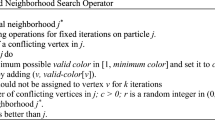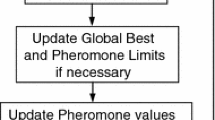Abstract
Given an undirected, connected, weighted graph, the leaf-constrained minimum spanning tree (LCMST) problem seeks a spanning tree of minimum weight among all the spanning trees of the graph with at least l leaves. In this paper, we have proposed an approach based on Quantum-Behaved Particle Swarm Optimization (QPSO) for the LCMST problem. Particle swarm optimization (PSO) is a well-known population-based swarm intelligence algorithm. Quantum-behaved particle swarm optimization (QPSO) is also proposed by combining the classical PSO philosophy and quantum mechanics to improve performance of PSO. In this paper QPSO has been modified by adding a leaping behavior. When the modified QPSO (MQPSO), falls in to the local optimum, MPSO runs a leaping behavior to leap out the local optimum. We have compared the performance of the proposed method with ML, SCGA, ACO-LCMST, TS-LCMST and ABC-LCMST, which are reported in the literature. Computational results demonstrate the superiority of the MQPSO approach over all the other approaches. The MQPSO approach obtained better quality solutions in shorter time.
Similar content being viewed by others
References
Achuthan NR, Caccetta L, Caccetta PA, Geelan JF (1994) Computational methods for the diameter restricted minimum weight spanning tree problem. Australasian J Combinat 10: 51–71
Borůvka O (1926) Pr̆ıspĕvek k r̆es̆enı otázky ekonomické stavby elektrovodnıch sıtı. Elektronický obzor 15: 153–154
Deo N, Micikevicius P (1999) A heuristic for the leaf-constrained minimum spanning tree problem. Congressus Numer 141: 61–72
Deo N, Abdalla A (2000) Computing a diameter-constrained minimum spanning tree in parallel. In: Bongiovanni G, Gambosi G, Petreschi R (eds) Algorithms and complexity, LNCS vol. 1767. Springer, Berlin, pp 17–31
Edelson W, Gargano ML (2002) Leaf-constrained minimal spanning trees solved by a genetic algorithm. Congres Numer 157: 41–48
Even R (1973) Algorithmic combinatorics. Macmillan, New York
Hoelting CJ, Schoenefeld DA, Wainwright RL (1995) Approximation techniques for variations of the p-median problem. In: Proceedings of the 1995 ACM Symposium on Applied Computing. ACM Press, pp. 293–299
Julstrom BA (2004a) Codings and operators in two genetic algorithms for the leaf constrained minimum spanning tree problem. Int J Appl Math Comput Sci 14: 385–396
Julstrom BA (2004) Better greedy heuristics for the leaf-constrained minimum spanning tree problem in complete graphs. Commun Discrete Appl Math 20: 213–221
Julstrom BA, Raidl GR (2003) Greedy heuristics and an evolutionary algorithm for the bounded-diameter minimum spanning tree problem. Proc ACM Symp Applied Computing. ACM Press, New York, pp 747–752
Kennedy J, Eberhart RC (1995) Particle Swarm Optimization. Proceedings of IEEE 1995 International Conference on Neural Network, IV. Piscataway, 1942–1948
Knowles J, Corne D (2000) A new evolutionary approach to the degree constrained minimum spanning tree problem. IEEE Trans Evolut Comput 4(2): 125–134
Kruskal JB (1956) On the shortest spanning subtree of a graph and the traveling salesman problem. Proc Amer Math Soc 7(1): 48–50
Narula G, Ho CA (1989) Degree-constrained minimum spanning trees. Comput Oper Res 7(4): 39–49
Nešetřil J, Milková E, Nešetřilová H (2001) Otakar Borůvka on minimum spanning tree problem. Translation of both the 1926 papers, comments, history. Discr Math 233(1-3): 3–36
Picciotto S (1999) How to encode a tree. Ph.D. Thesis, University of California, San Diego
Raidl GR (2000) An efficient evolutionary algorithm for the degree-constrained minimum spanning tree problem. Proc Congress Evolutionary Computation CEC00. IEEE Press, Piscataway, NJ, pp 104–111
Singh A (2008) An artificial bee colony algorithm for the leaf-constrained minimum spanning tree problem. Appl Soft Comput 31: 327–334
Singh A, Baghel AS (2008) New metaheuristic approaches for the leaf-constrained minimum spanning tree problem. Asia-Pacific J Operat Res 25: 575–589
Sun J et al. (2004) Particle swarm optimization with particles having quantum behavior. Proc.of Congress on Evolutionary Computation pp. 325–331
Sun J et al. (2004) A global search strategy of quantum-behaved particle swarm optimization. Proc. IEEE Conference on Cybernetics and Intelligent Systems, pp. 111–116
Sun J, Xu W, Liu J (2005) Parameter selection of quantum-behaved particle swarm optimization. Proc Adv Nat Comput Lect Notes Comput Sci 3612: 543–552
Van den Bergh F (2001) An analysis of particle swarm optimizers. Ph.D. Thesis. University of Pretoria
Author information
Authors and Affiliations
Corresponding author
Rights and permissions
About this article
Cite this article
Farzi, S., Dastjerdi, A.B. Leaf constrained minimal spanning trees solved by modified quantum-behaved particle swarm optimization. Artif Intell Rev 34, 1–17 (2010). https://doi.org/10.1007/s10462-010-9158-x
Published:
Issue Date:
DOI: https://doi.org/10.1007/s10462-010-9158-x




